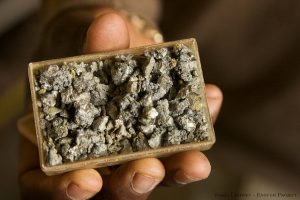
Tin ore.
Photo: Sasha Lezhnev
When any U.S. federal government agency purchases computers or monitors, it now must take into account the progress the company manufacturing the products is making on combating the conflict minerals trade. As of the new standard adopted in March 2018, the federal government procurement requirements for all computers and monitors now include key conflict minerals provisions, including due diligence, whether the company is helping build the conflict-free trade in the Democratic Republic of Congo and the region, and whether the company is sourcing from audited, conflict-free smelters.
This important step, which the Enough Project contributed towards during the consultation phase, complements the Dodd-Frank 1502 legislation.
A multi-year process to update the standards that guide federal procurement practices, called the Institute of Electrical and Electronics Engineers (IEEE) standards, concluded in March 2018. The standard, known as the IEEE 1680.1™ – 2018 Standard for Environmental and Social Responsibility Assessment of Computers and Displays, covers several important criteria to help determine products’ environmental sustainability, for the first time ever, conflict minerals provisions were also incorporated.
The updated IEEE standards were subsequently adopted by the Environmental Protection Agency (EPA) as criteria for its Electronic Product Environmental Assessment Tool (EPEAT). Federal purchasers in the United States, as well as others around the globe including Australia and Canada, are required to procure products that meet this standard.
Three conflict minerals criteria were ultimately adopted into the final standard – one that companies are required to meet for their products and two that provide optional opportunities for companies to improve their scores.
- In order to be “EPEAT registered,” companies will now be required to publicly disclose their use of tin, tantalum, tungsten, and gold, as well the due diligence they conduct on their supply chain. This reinforces the reporting requirements publicly traded companies are obligated to fulfill under the Securities and Exchange Commission’s (SEC) Conflict Minerals Rule, which has been in place since 2012.
- Additionally, companies receive extra credit for participating in responsible sourcing programs in Congo and the surrounding region; and
- Companies receive credit for verifying that at least 90 percent of their tin, tungsten, tantalum, and gold smelters and refiners are participating in or have passed independent third-party audits. This is important, because certain companies have taken strong steps to weed out non-audited smelters from their supply chains and thus have 90%+ audited smelters, but many others have lagged behind.
The new criteria add to the growing call for companies to source conflict-free minerals from Congo and to conduct and disclose their due diligence mechanisms for doing so. The increase of consumer and company attention to this issue in recent years has contributed to a vast decrease in mines controlled by armed groups in eastern Congo in the tin, tungsten, and tantalum (3T) sectors. As of the most recent study by the International Peace Information Service in 2016, 79 percent of 3T miners surveyed in eastern Congo did not work under the control of armed actors. However, gold still remains a significant source of funding for armed actors, in particular Congolese army commanders, but with the addition of the EPEAT conflict minerals criteria and other regulations in the United States, the European Union, China, and elsewhere, opportunities for demilitarizing the gold trade are also on the rise.
The process of updating the EPEAT standards drew on knowledge and input from stakeholders in the U.S. government and the private sector. The Enough Project was the only conflict minerals-focused NGO that regularly participated in the working group.
The standards will likely be in place for at least 10 years, meaning companies vying for federal procurement contracts will have to demonstrate a baseline level of conflict minerals reporting and due diligence to be eligible. Full compliance and reporting under the SEC’s Conflict Minerals Rule will now serve the dual purpose of providing the necessary information for companies to meet EPEAT’s conflict minerals criteria.
The following is an excerpt from the EPEAT Standard (from #1 above). The other other two criteria are available on the IEEE website.
“4.10.2 Conflict minerals
4.10.2.1 Required—Public disclosure regarding conflict minerals in products
Corporate criterion: Manufacturer shall annually publicly disclose information on the use of necessary conflict minerals in its products for, at a minimum, the products declared to conform to this standard.
Annual public disclosure(s) shall include the following:
- a) A company sourcing policy or supplier code of conduct that addresses conflict minerals.
- b) Description of how the manufacturer conducted a reasonable country of origin inquiry (RCOI) with its direct suppliers and publication of the list of smelters or refiners reported by those suppliers; and
- c) Description of the due diligence measures the manufacturer has conducted on the source and chain of custody of the conflict minerals in their products which may have originated from the covered countries, or conflict-affected and high-risk regions.
Conformity to items b) and c) can be met by providing a website link to manufacturer’s conflict minerals disclosure pursuant to Rule 13p-1 of the U.S. Securities and Exchange Act of 1934.
This criterion shall be declared the same in all countries or regions for which the product is declared to conform to this standard. The approach used to conform to this criterion may vary by country or region.
Applies to: All manufacturers with products declared to conform to this standard.
Verification requirements: a) URL(s) and/or copies of the relevant annual public disclosure(s) that meets the requirements of this criterion, for the duration of time for which the manufacturer has declared to conform to this criterion.”

